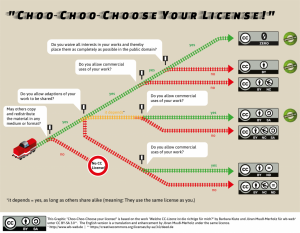https://www.fairopenaccess.org/the-fair-open-access-principles/
All posts by polla
Empfehlungen zur Transformation des wissenschaftlichen Publizierens zu Open Access
OA Farbenlehre
Im Blog der TIB Hannover gibt es eine sehr gute Übersicht über die Open-Access-Farbenlehre. Was bedeutet Gold, Grün, Bronze, Blau im Zusammenhang mit Open-Access-Veröffentlichungen?
Siehe auch: https://av.tib.eu/media/49667
WIAS-PDI Open Access Tag
Die Folien und Voträge sind auf dem Repositorium abrufbar.
Open Peer Review – eine Lösung des Raubverlage-Problems?
Predatory Open Access Journals – Ausweg Open Peer Review?
Der o.g. Artikel von Leonhard Dobusch (Universität Innsbruck) und Maximilian Heimstädt (Universität Witten/Herdecke) ist in „Synergie: Fachmagazin Für Digitalisierung in Der Lehre“ erschienen.
Six Things to Do Now You’ve Got an ORCID iD
Paywall: The Business of Scholarship (Full Movie) CC BY 4.0
Paywall: The Business of Scholarship, produced by Jason Schmitt, provides focus on the need for open access to research and science, questions the rationale behind the $25.2 billion a year that flows into for-profit academic publishers, examines the 35-40% profit margin associated with the top academic publisher Elsevier and looks at how that profit margin is often greater than some of the most profitable tech companies like Apple, Facebook and Google. For more information please visit: Paywallthemovie.com
Paywall: The Business of Scholarship (Full Movie) CC BY 4.0 from Paywall The Movie on Vimeo.
Google Scholar, Web of Science, and Scopus: a systematic comparison of citations in 252 subject categories
Google Scholar found nearly all WoS (95%) and Scopus (92%) citations […] in all areas GS citation data is essentially a superset of WoS and Scopus, with substantial extra coverage. Now in Journal of Informetrics. FREE
Abstract
Despite citation counts from Google Scholar (GS), Web of Science (WoS), and Scopus being widely consulted by researchers and sometimes used in research evaluations, there is no recent or systematic evidence about the differences between them. In response, this paper investigates 2,448,055 citations to 2,299 English-language highly-cited documents from 252 GS subject categories published in 2006, comparing GS, the WoS Core Collection, and Scopus. GS consistently found the largest percentage of citations across all areas (93%-96%), far ahead of Scopus (35%-77%) and WoS (27%-73%). GS found nearly all the WoS (95%) and Scopus (92%) citations. Most citations found only by GS were from non-journal sources (48%-65%), including theses, books, conference papers, and unpublished materials. Many were non-English (19%-38%), and they tended to be much less cited than citing sources that were also in Scopus or WoS. Despite the many unique GS citing sources, Spearman correlations between citation counts in GS and WoS or Scopus are high (0.78-0.99). They are lower in the Humanities, and lower between GS and WoS than between GS and Scopus. The results suggest that in all areas GS citation data is essentially a superset of WoS and Scopus, with substantial extra coverage.
Paper DOI
License
No license
“Choo-Choo-Choose your license!” Infographic on Creative Commons licences
Open Access Woche
Die internationale Open Access Week findet in diesem Jahr vom 22. bis 28. Oktober statt.
Es gibt u.a. auch Aktivitäten in Berlin, siehe den zentralen Kalender unter http://openaccessweek.org/events/.
